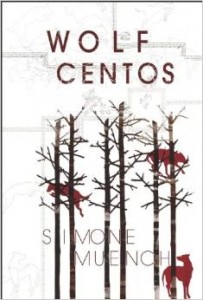72 pages, $14.95
Review by Carlo Matos
Simone Muench’s Wolf Centos is a collection of short, muscular and sinewy centos drawn from a dizzying array of sources—from Anna Akhmatova to Fernando Pessoa, from Paul Celan to Edith Sitwell, not to mention Shakespeare, Dylan Thomas, Dara Wier, and W.B. Yeats. Indeed, as the epigraph to Section 1—taken from Oliver Stone’s 1991 movie, The Doors—makes perfectly explicit, “All the poetry has wolves in it.” The book that immediately came to my mind while I was reading these poems was Herman Hesse’s Steppenwolf, which interestingly is not one of Muench’s source texts. Their respective approaches to the symbology of the wolf are quite similar—at least at first glance. In Steppenwolf, for example, the aging protagonist realizes that his nature is dual: “He went on two legs, wore clothes and was a human being, but nevertheless he was in reality a wolf of the Steppes.” As Hesse’s novel progresses, however, the human/wolf dialectic fractures into a multitude: “His life oscillates, as everyone’s does, not merely between two poles, such as the body and the spirit, the saint and the sinner, but between thousands and thousands.”
Simone Muench also deals, to some extent, with these ideas but her concerns are a bit different. Where Hesse is concerned mainly with the metaphysics of the self, Muench is aiming at something more immediate, more primal, or more elemental. In an interview in The Jet Fuel Review, she says, “Ultimately elegiac, these particular poems oscillate between transformation and stasis, wildness and domesticity, damage and healing.” But she goes beyond these polarities when she says, “The ‘wolf’ of these centos becomes a symbol of a threshold, a transformative space, as well as a mode of meditation.” Her speakers do not merely oscillate between two poles (the human and the animal, the interior and the exterior, the domestic and the wild), they are always “under,” “behind” or “in” the wolf and the wilderness it carries in its mouth and in its fur. If you follow these prepositions, they tend to arise when Muench is contemplating the wolf who “like a much-hunted animal fix[es] us in her eyeshine.” Continue reading
![[PANK]](https://pankmagazine.com/wp-content/themes/pank/assets/images/pank-logo-large.png)

